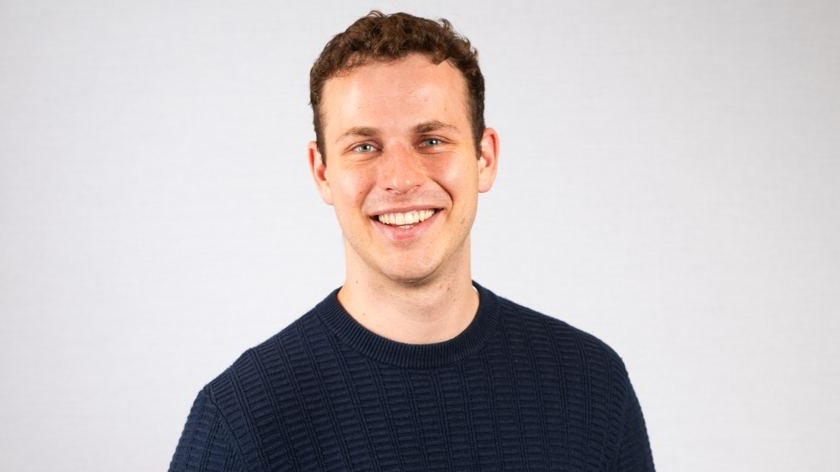Empresa
Cadeia de aminoácidos
Localização
EUA
Setor
Saúde e biotecnologia
Ano
2023
Precisamos resolver isso.
Caspar Barnes tinha 12 anos quando desenvolveu um melanoma maligno, um tipo agressivo de câncer de pele. Ele teve sorte – o câncer foi detectado precocemente – e Barnes se lembra de acordar da cirurgia com o médico ao lado de sua cama segurando uma amostra da biópsia. “Eledisse: ‘Veja só. Isso é o que removemos da sua região lombar’. E eu respondi: ‘Legal, posso levar para casa? Quero mostrar aos meus amigos na escola!’” Em vez disso, o médico explicou que precisavam manter a amostra e estudá-la. Barnes era muito jovem para realmente entender a ética do que estava acontecendo, mas sua mãe assinou um termo de consentimento e a amostra biológica foi entregue, para nunca mais ser vista.
Ter sido introduzido no mundo da saúde desde muito jovem levou Barnes, que é da África do Sul, a seguir carreira na área das ciências da vida. Anos mais tarde, enquanto cursava uma pós-graduação na Columbia, ele se viu relembrando a situação com a amostra da biópsia. Ele estava conduzindo uma pesquisa sobre tecido cancerígeno doado e percebeu que não tinha como informar ao paciente o que estavam descobrindo. Quando perguntou ao seu pesquisador principal se havia uma maneira de compartilhar essas informações, ele ouviu: “Não sei a quem pertence essa amostra – ela veio do biobanco”. Isso “me deixou perplexo”, diz Barnes, que ficou impressionado com a desconexão entre a pesquisa pré-clínica e as pessoas que forneciam as amostras. Aos seus olhos, era uma questão interdisciplinar que envolvia questões de confiança, consentimento e como proceder para obter amostras biológicas. “Eu pensei: isso é loucura”, diz ele, “precisamos resolver isso”. A resposta, ao que parece, estava na criptografia.
Criando um protocolo blockchain
No final de 2022, Barnes fundou a AminoChain, uma startup de tecnologia da saúde que usa a tecnologia blockchain para rastrear e codificar amostras biológicas, a fim de criar um mercado descentralizado para o setor. “Sevocê transformar amostras biológicas em NFTs, elas se tornam rastreáveis”, diz ele. “Nesse protocolo blockchain, é possível criar qualquer número de aplicativos... e, é claro, programar regras nesses ativos digitais que permitem aos pacientes rastrear para onde vão suas amostras.” Hoje , a empresa conta com uma equipe de 14 pessoas, arrecadou US$ 7,8 milhões em financiamento e trabalha com uma rede de 22 biobancos. A empresa está atualmente rastreando os dados de aproximadamente 350 milhões de amostras biológicas, de mais de 100 mil pacientes, e atendendo cerca de 100 pesquisadores em grandes empresas farmacêuticas, no instituto nacional de saúde e em universidades.
Embora Barnes tivesse uma série de credenciais acadêmicas (bacharelado em artes e ciências (BA e BSc com especialização em economia e neurociência pela UCL e pós-graduação pela Columbia e Harvard), ele estava procurando colaboradores com formação em ciência da computação. Entrar para a Antler em Nova York foi uma oportunidade natural para fazer essas conexões. Enquanto estava lá, ele também participou de um hackathon e conseguiu montar uma equipe de engenheiros capazes de construir um protótipo. Fundamentalmente, a Antler o ajudou a aprimorar o foco da startup. “Olhando para trás, para o que estávamos fazendo em 2022, era ridículo... não fazia sentido. Estávamos tentando fazer o impossível, sendo excessivamente quixotescos e nunca iríamos chegar a nada produtivo. E, em meio a tudo isso, a Antler de alguma forma conseguiu acreditar em nós.”
A primeira aplicação do AminoChain foi um mercado de amostras biológicas chamado “centro de amostras”, que reúne o inventário de biobancos para facilitar aos pesquisadores a localização rápida e o licenciamento de amostras biológicas. Como explica Barnes, existem cerca de 2.500 biobancos nos Estados Unidos, com cerca de 200 milhões de amostras biológicas armazenadas em todos eles. “E 90% de todas essas amostras biológicas não estão sendo utilizadas em pesquisas porque as pessoas não conseguem encontrá-las.”
Divulgação de guerrilha
Conseguir o envolvimento dos biobancos foi, a princípio, um desafio. “Acabeiindo aos hospitais e perguntando: ‘onde fica o laboratório de flebotomia?’ e, em seguida, procurando o flebotomista e perguntando: ‘onde fica o biobanco?’”, conta Barnes, descrevendo sua estratégia de “divulgação guerrilheira”. Então, em uma conferência sobre amostras biológicas em Seattle, ele finalmente convenceu seu primeiro biobanco a fazer um teste piloto. “Aumentamosa distribuição de amostras biológicas em três vezes ao longo de três meses”, diz Barnes. “E eles adoraram.” De repente, o interesse começou a crescer, com a abordagem da AminoChain no Vale do Silício impressionando um setor que estava atrasado em termos de tecnologia. “Não existe um software dedicado para biobancos em geral”, diz Barnes.
A AminoChain reúne uma equipe com experiência em blockchain, bioética e ciências da vida. Muitos têm doutorado em suas áreas de atuação ou já trabalharam na indústria farmacêutica; um dos membros da equipe foi diretor de receitas de um dos maiores mercados de amostras biológicas e levou a empresa a abrir o capital. Isso se combina com a energia de Barnes, de 27 anos, e de seu cofundador, Max Matthews, um engenheiro autodidata que ele conheceu em uma hackatona em Nova York. “Ele nem mesmo frequentou a universidade”, diz Barnes. Essa mistura de jovens ambiciosos com pessoas com conhecimento e sabedoria tem sido especial, diz Barnes: “Acho que issoé algo com que temos muita sorte”.
Agora que a AminoChain agregou uma grande rede de biobancos, Barnes está olhando para o futuro. O foco tem sido construir confiança com seus usuários, mas agora eles estão na “parte realmente empolgante”, em que podem começar a integrar recursos habilitados por blockchain na plataforma que as pessoas estão usando atualmente. “Isso é o mais importante agora”, diz ele. “Como podemos unir a criptografia com a biotecnologia?”





